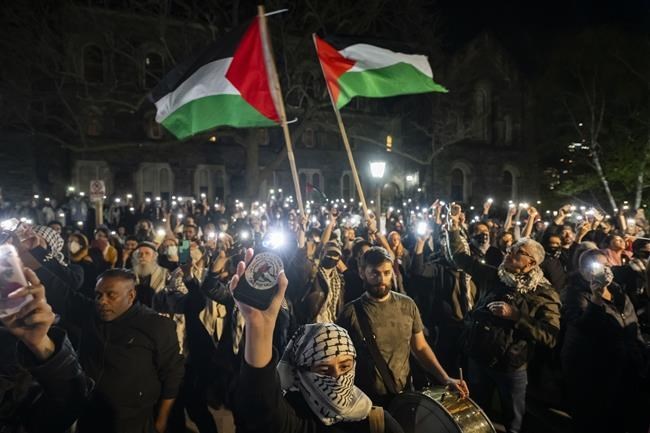TORONTO — At a pro-Palestinian protest encampment at the University of Toronto, organizers say some students are attending online summer classes from their tents, others are working on assignments from the site and some faculty supporting the demonstration are working from the area.
Those involved in the protest that has taken over a large grassy field at the heart of the downtown campus say they're prepared to stay until the university seriously addresses their demands.
"I personally am willing to place this above any and everything else," Sara Rasikh, one of the encampment organizers, said Wednesday at the encampment.
"We want, as students, for the university to listen to us."
The encampment, which was established last Thursday, has grown over the past week and now features numerous tents, banners and Palestinian flags in an area of campus known as King's College Circle.
Protesters say they want the university to disclose its ties with the Israeli government and divest from Israeli companies.
Rasikh, a 24-year-old graduate student at the university, said she is prepared "for the long haul." That could see her work on and even submit her thesis from the encampment, she said.
"That's a sacrifice I am able to make and I have that privilege," she said, adding that she had been looking for a summer job before the protest began but was now living off her savings while she was at the encampment.
"Our ultimate goal is to urge UofT to be a leader in divesting from the oppression of Palestinians."
Erin Mackey, another protest organizer, said members of the encampment have had two discussions with university administrators in recent days but those have focused on sanitation and other logistical issues related to the encampment.
She said the protest group indicated it would no longer participate in talks unless the discussions were about its core demands. The university indicated it was unwilling to talk about those demands, she said.
"They have all these other things that they want addressed but they're not addressing the core issue, which is why we are here," she said during a news conference held at the encampment Wednesday.
"They're giving us the runaround and we're calling them out, saying that's not good enough."
The university said Wednedsay that it is continuing to correspond with student representatives for the encampment and is currently focused on its "responsibility for the health, safety, and security of our students."
The institution said it has "serious concerns" after witnessing issues that include large piles of firewood inside the fenced-off encampment area, hateful messages and speech, as well as altercations and “significant population density” at the encampment.”
"Because of the ongoing encampment, two demonstrations numbering in the thousands … have come to university grounds well into the evening. As the summer term has begun, students are living in nearby residence buildings and this poses an additional safety risk,” two university leaders wrote in a statement shared by the school in response to questions about the protesters' criticisms.
"Our accountability for the health and safety of our community is a critical priority. We look forward to resolving these concerns and moving on to substantive discussions as quickly as possible.”
Mackey said the issue of sanitation arose because the university locked out students from campus bathrooms overnight but they have since granted access, resolving that issue.
Rasikh said safety concerns have only arisen when shouting counter-protesters gather outside the encampment, adding that she personally feels safe at the protest site.
The university is "mischaracterizing the situation," said Mackey.
"We are here to set the record straight. Thus far, the administration has not engaged in any conversations regarding our demands," she said.
Kalliopé Anvar McCall, a fourth year student, said she packed lightly and has been swapping the same two shirts since she began camping last week. She said, however, that she didn't want to focus on any minor discomforts.
"Even though it can be difficult in moments, like camping out here and dealing with counter-protesters, I really don't want to centre our own discomfort or complaints or troubles as students," she said.
"This isn't about us. And we're not asking community members or listeners to stand in solidarity with us. We're asking you to stand in solidarity with Palestine."
The encampment is one of several set up on university campuses in recent weeks.
Pro-Palestinian activists have also set up tents at McGill University in Montreal, the University of Ottawa, McMaster University in Hamilton and the University of British Columbia campus in Vancouver.
This report by The Canadian Press was first published May 8, 2024.
Fakiha Baig, The Canadian Press
